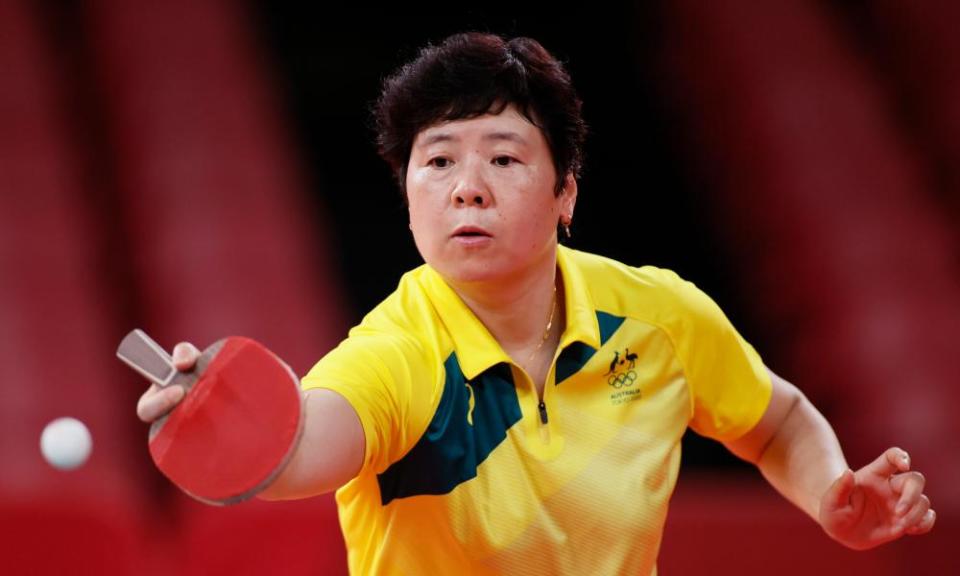Jian Fang Lay becomes cult figure of Australian table tennis at sixth Olympics

Until this month, few Australian sports fans had heard of Jian Fang Lay. Despite appearing at every Olympics since Sydney 2000, and winning seven Commonwealth Games medals, the 48-year-old had flown under the radar. With minimal funding and limited media interest, Australia’s table tennis players too often toil in obscurity.
No longer. By competing at Tokyo 2020, Lay has become one of only two Australian women to contest six Olympic Games. Her run to the third round of the women’s singles table tennis competition captivated the nation – Lay has become a cult figure. On Sunday, she will be back at the table in the team’s contest.
Related: Olympics 20 for 2020: Australian athletes to watch in Tokyo
“I’m now afraid to go out,” laughs Lay when asked about her new-found fame back home. “Everyone knows about me. I’m very grateful for Australia’s support – all the messages, go go go. It means a lot.”
Born in China, Lay moved to Melbourne in 1994 and soon became one of Australia’s best table tennis players. She has spent much of the subsequent two and a half decades trotting the globe representing Australia in Oceania Championships, World Championships, Commonwealth Games and the Olympics.
A mother of two, Lay has spoken of her gratitude to her husband, Jorge Lay, for his support as she represented Australia. “He gives me all the support – takes annual leave from work, so he can look after our children while I’m away competing,” she said in 2017.
Lay was a late call-up to the Tokyo Games following the withdrawal of Stephanie Sang. Lay says she was untroubled by her late addition. “It didn’t worry me,” she says. “When I heard I got on the team, I was very excited.”
But Australia’s table tennis head coach John Murphy speaks glowingly of Lay’s willingness to accept the last-minute roster spot. “It just shows how professional Jian is,” he says. “She was prepared and ready, even on the late notice.”

Lay, ranked 156th in the world – Australia’s highest-ranked player – had a successful start to her Tokyo campaign. She beat Cuba’s Daniela Fonseca in qualifying, before triumphing over Italy’s Debora Vivarelli in the first round. Lay then beat Poland’s Qian Li to progress to the third round – equalling her best Olympic individual performance.
But Lay’s dream run would end on Tuesday, losing four sets to zero to three-time European champion and Rio 2016 silver medallist Han Ying of Germany. It was heartbreak for Lay, who was 5-0 up at one stage the first set, but suffered from a controversial referee’s decision with the first set evenly balanced following a fight-back from her opponent.
“The umpire gave the point to the German player,” says Lay, still evidently disappointed by the call. “That’s why I lost the first match. The second match I was still thinking a little bit [about it]. But she’s a very good player. I did try my best.”
With Germany and Australia facing off in the team’s competition on Sunday, a rematch may be on the cards. “Maybe I play her again,” she adds. “But the second time I will know the things I will need to do.”
Head coach Murphy says he is grateful for the experience Lay brings to the team. “The biggest thing she brings for Australia is her belief that she can win on the biggest stage,” he says. “That comes out here at the Olympic Games when you go out to play a European champion, a multiple European champion – it shows the next generation of Australian players that it is possible to compete at the highest level. That’s a huge part – that belief factor.”
Murphy is also grateful for the boost to his sport’s profile back in Australia. The sport is approaching a financial cliff after the Australian Institute of Sport cut Table Tennis Australia’s able-bodied high performance funding for 2021-2022. They had previously been receiving a quarter of a million dollars each year.
“It has been huge for table tennis to have the coverage that Jian has been able to achieve, with the results that she has had here in Tokyo,” says Murphy. “Obviously from a grass roots perspective we will have an influx of young players having been inspired by the performance of Jian and the team.
“From a performance perspective, we’re building towards the Commonwealth Games next year and the Olympics in Paris with Jian firmly in our plans,” he continues. “Any player who can get the results that Jian did here would be going to the Commonwealth Games with a chance to win medals. So from a performance perspective it’s huge for us.”
The humble Lay is not thinking so far ahead. “Six Olympics is a big achievement for myself and my team as well,” she says. “I think it’s a long time to go [to Paris] – three years is a long time. I have a one year plan – not thinking too much [about the longer-term].”
Instead, Lay is just happy that her sport is enjoying new found popularity in Australia. “Now a lot of people can know how good is table tennis,” she says. “Table tennis is a thinking game you know. You have to play smart and quick.”

 Yahoo Finance
Yahoo Finance 